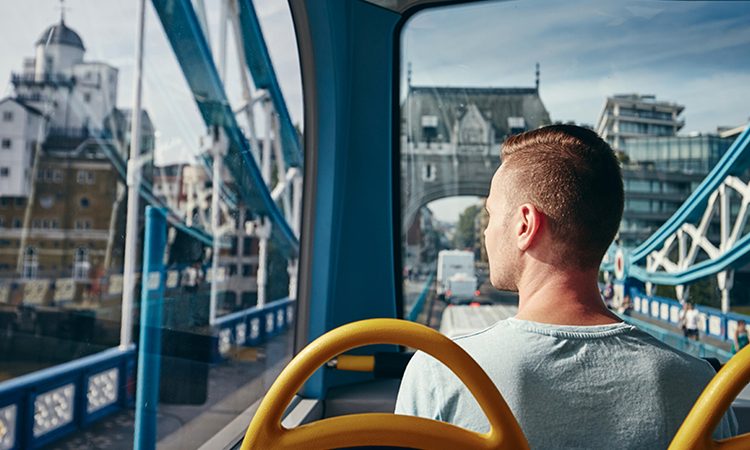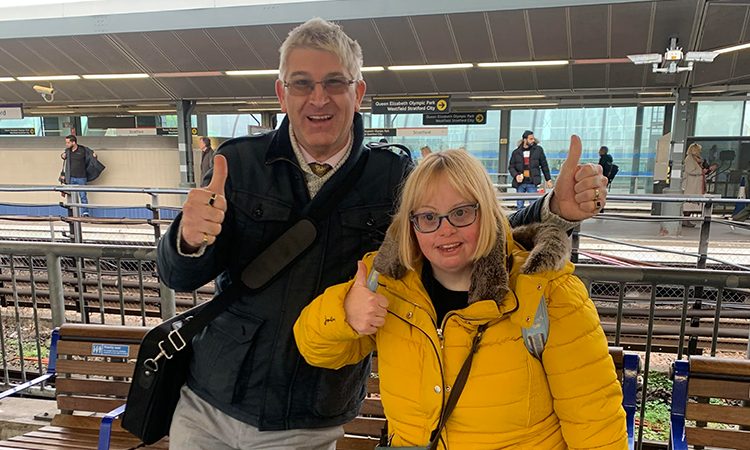Empowering inclusive travel: A collaborative approach to enhancing public transportation experiences in London
- Like
- Digg
- Del
- Tumblr
- VKontakte
- Buffer
- Love This
- Odnoklassniki
- Meneame
- Blogger
- Amazon
- Yahoo Mail
- Gmail
- AOL
- Newsvine
- HackerNews
- Evernote
- MySpace
- Mail.ru
- Viadeo
- Line
- Comments
- Yummly
- SMS
- Viber
- Telegram
- Subscribe
- Skype
- Facebook Messenger
- Kakao
- LiveJournal
- Yammer
- Edgar
- Fintel
- Mix
- Instapaper
- Copy Link
Posted: 2 January 2024 | Mark Evers - Transport for London | No comments yet
Mark Evers, Chief Customer Officer at Transport for London (TfL), sat down with Intelligent Transport’s Halimah Haque to discuss TfL’s new partnership with the British Institute of Learning Disabilities and People First – which will work to gather insights into the challenges faced by individuals with autism, learning disabilities or difficulties – and to exclusively share his insight into the importance of identifying, acknowledging and working to tackle these challenges in order to deliver a transport network that enables all passengers to be able to travel independently with confidence.


How does the newly launched partnership between Transport for London (TfL), the British Institute of Learning Disabilities (BILD) and People First aim to gather insights into the challenges faced by individuals with autism, learning disabilities or difficulties when using public transportation in London?
We recognise that travelling on the transport network can be a challenge for some people, and we have worked hard to make improvements to the accessibility of the transport network”
We have partnered with BILD and People First as they are experts in representing the views and challenges that are faced by people with autism, learning disabilities or difficulties. We recognise that travelling on the transport network can be a challenge for some people, and we have worked hard to make improvements to the accessibility of the transport network. We believe that it is important to listen to the people who are affected by these difficulties to understand where the barriers are, how they’re changing and what more we can do to support them. In order to gain the necessary insight we are planning to carry out a comprehensive survey in partnership with BILD and People First.
How did this partnership come to be, and what do you hope it will achieve in the future?
We’re continually improving the transport network and new technologies help us to do this, but they can also potentially add challenges”
This is the next phase of work that TfL is undertaking to try to better understand the needs of customers with neurodiverse conditions or learning disabilities or difficulties. Since 2011, we’ve run the Valuing People Network, which includes representatives from some of those groups. The purpose is to better understand what we can do to make improvements to the transport network so that people are able to travel independently and with confidence. Whilst the network has proven to be very successful; we have undertaken this procurement activity to partner with BILD and People First to give us additional insight to support this important group of people.
We’re continually improving the transport network and new technologies help us to do this, but they can also potentially add challenges to the way that people with autism or learning disabilities or difficulties experience the transport network. So, we hope that by developing a better understanding of what these barriers are and, in some ways, co-developing the solutions with people who are experiencing this day in and day out, we will be able to create a more accessible transport network for everyone.
Why is it so important that more information is gathered, and a clearer understanding gained regarding the travel experience of those with autism or learning disabilities?
It’s important that we understand where the barriers are for anybody who is making use of the transport system and do all that we can to remove these”
It’s Transport for London’s role to provide a network that enables all Londoners to access the fantastic opportunities that are afforded by this great city, whether that’s access to jobs, healthcare, education or just to visit friends and family. So, it’s important that we understand where the barriers are for anybody who is making use of the transport system and do all that we can to remove these so that people can access these opportunities. Essentially, this is just a further opportunity for us to really get that in-depth understanding, which will hopefully help us to come up with better solutions in the future to create a fairer transport network.


Credit: Transport for London
You briefly mentioned a survey, but what other measures are in place to ensure a more comprehensive understanding of diverse experiences and challenges faced by these groups when using public transportation?
We engage extensively with a wide variety of stakeholder groups who represent the interests of all of our customers”
Surveys are important to understand what people are thinking and feeling, as well as what they wish to see done differently in the future, but this is only one way in which we develop our understanding. We also look at complaints that we receive, which provide us with an opportunity to learn how to do things better in the future. In addition, we engage extensively with a wide variety of stakeholder groups who represent the interests of all of our customers. We also take feedback from our operational colleagues who are working on the network. This includes situations where a customer has said something to them about how we could improve things. Additionally, our operational colleagues are experts in understanding what they need more of in order to support our customers, as well.
Also, when we make decisions – whether that’s on changes to policy or where we’re investing in the future to make improvements – we carry out equality impact assessments that specifically look at the unique impacts that changes or improvements might have upon particular groups of customers. By piecing all of this information together, we try to ensure that the network becomes progressively more accessible to everyone over time.
Do you think that the public transport industry is working hard enough to create an accessible and inclusive environment?
There is far greater awareness of the need to provide a truly inclusive transport system, one that ensures greater equity for all customers using the network. But there’s a lot more to do”
I think that the transport industry, more generally, and TfL are working really hard to make the network more accessible. But, I think that there is still an awful lot more to do, and we are aware that over many, many decades, there have been barriers that have become a part of the network in an unintended way, and we need to work hard to remove those. We also need to think very carefully, as we expand the network and change the network in the future, about how we can ensure that we start from a point of inclusive design. This is to make sure that we don’t inadvertently do things that might disadvantage people in the future.
I think, culturally, there is far greater awareness of the need to provide a truly inclusive transport system, one that ensures greater equity for all customers using the network. But there’s a lot more to do, whether that’s continuing to introduce better training for operational colleagues, investing in new physical infrastructure to make the network more accessible or thinking carefully about the way in which we provide information through a variety of channels, so that people are able to choose a way of understanding the transport network that best suits them.
What do you think the future Transport for London customer experience will look like?
There’s no silver bullet here. It is about continuing with relentlessness chipping away at any barriers that are in place”
I think, in many ways, it will be incremental improvements on the good customer service that we already provide today. We undertake extensive customer satisfaction surveys and, although we don’t get it right all of the time and there are improvements to be made, more often than not, we provide safe and reliable services for our customers.. There’s no silver bullet here. It is about continuing with relentlessness chipping away at any barriers that are in place and to make those improvements week upon week, year upon year, so that the network becomes more accessible.


Related topics
Passenger Accessibility, Passenger Experience, Public Transport
Related modes
Bus & Coach, Train
Related cities
London
Related countries
United Kingdom
Related organisations
British Institute of Learning Disabilities (Bild), People First, Transport for London (TfL)
Related people
Mark Evers







